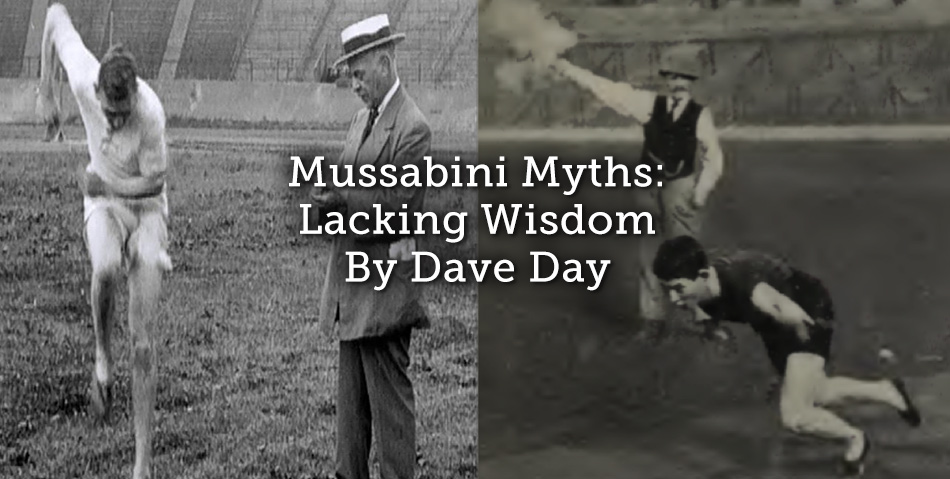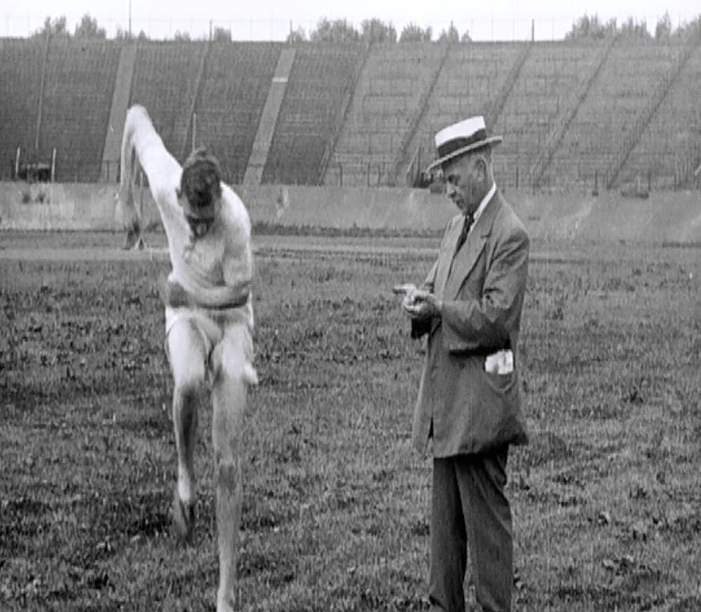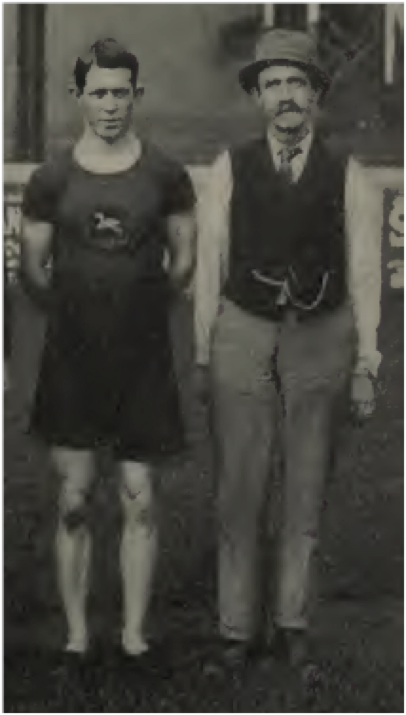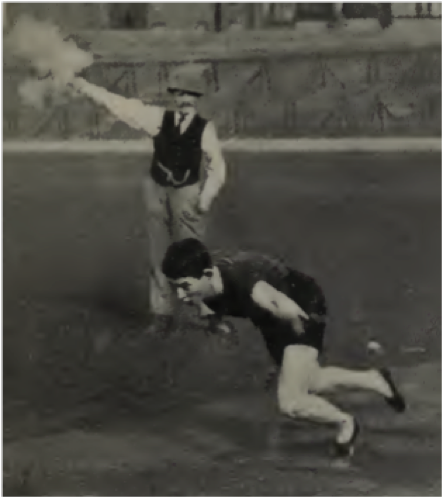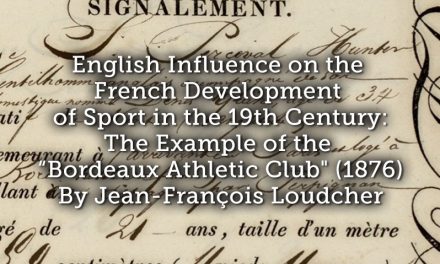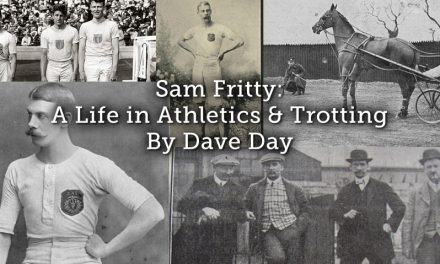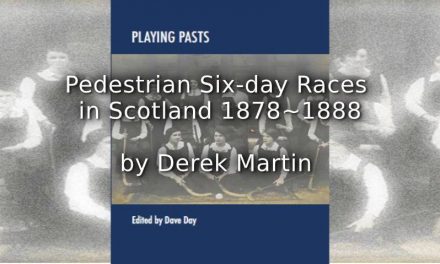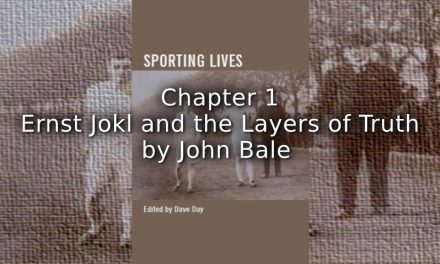Mussabini Myths: Lacking Wisdom.
In December 1998, the National Coaching Foundation honoured Scipio Africanus (Sam) Mussabini by striking a ‘Mussabini Medal’ awarded to British coaches who have coached outstanding elite athletes. The rationale for this award was based on an interpretation of Mussabini’s life that has been repeated ad nauseum in both popular and scholarly literature, normally verbatim and invariably without adequate reflection. When English Heritage erected a blue plaque to Mussabini in July 2012 their justification followed the standard script. According to this narrative, Mussabini had coached eleven Olympic medal winners including, apparently, the 1908 sprint champion Reggie Walker. His ‘most famous’ success, thanks primarily to the portrayal of the event in the 1981 Oscar-winning film Chariots of Fire, was Abrahams’ winning of the 100m in the 1924 Paris Olympics even though Mussabini had apparently been ostracised because he was a paid coach.
- Mussabini with Abrahams in 1924
The evidence suggests that Chariots of Fire distorted the boundaries between fact and fiction, boundaries that are further obscured by the paucity of detailed scholarly material on Mussabini, leaving a number of questions unanswered concerning the activities of a man who has been called ‘the father of British coaching’. This article briefly considers two aspects of the narrative, the suggestion that Mussabini was prevented from watching Abrahams win in Paris because professionals were not allowed into the stadium and, secondly, the oft-repeated notion that he coached South African Reggie Walker to become Olympic sprint champion in 1908.
The Exclusion Myth
According to legend, Mussabini was denied the opportunity of seeing Harold Abrahams win the 100 metres in 1924 because, as a professional coach, he was banned from the stadium. In Chariots of Fire Mussabini waits nervously in a room near the stadium, learning of Abrahams’ victory only when the national anthem is played. However, this seems a little strange given that the British team had been accompanied by officially appointed paid trainers since Stockholm in 1912 when the AAA had engaged four trainers. These men included ‘Bill’ Thomas, who is best remembered for coaching Oxford University between the Wars and chief trainer Alec Nelson, a self-employed athletics trainer, who had been coaching at Cambridge University since at least 1908. Given that both Nelson and Thomas had long careers as paid trainers at Oxford and Cambridge there was clearly an acceptance within the amateur athletic elite of the need for professional assistance well before Abrahams’ victory. The AAA application to the BOA for funding prior to Paris in 1924 included £500 for trainers which incorporated payments to Harry Andrews, and to field events coach, Sergeant Instructor Starkey. When the team went to Paris it was supported by three masseurs, a medical advisor and six coaches, all of whom appeared together on a photograph in the BOA report following the Games and there is no obvious evidence that they would have been barred from the stadium.
Spencer Wisdom
Another assertion in the Mussabini literature is that he coached the 1908 100m Olympic champion Reggie Walker of South Africa. A 1909 photograph is sometimes interpreted as evidence for this relationship, even though the caption refers to Sam Wisdom and commentators of the period clearly stated that Walker had ‘one of the best trainers, Sam Wisdom’, an ‘old Sheffield sprinter’ who had ‘made a runner of Reggie Walker’.
- Spencer ‘Sam’ Wisdom with Reggie Walker
Spencer ‘Sam’ Wisdom, born circa 1850, was living with his family and working as a plumber in Marylebone, London, by 1871. He competed regularly in London and Sheffield as a professional sprinter. Like other Sheffield events the Easter handicap at Hyde Park in April 1878 had attracted American, Australian and Canadian competitors plus most of the noted British sprinters, including the previous winner Harry Hutchens of Putney and Sam. The men also met regularly in London handicaps and they formed a professional relationship. Sam, in his role as Hutchens’ trainer, left England for Australia with Harry in October 1886, accompanied by Hutchens’ backer, Arthur Markham. During December 1886 and January 1887 Hutchens, looked after by Wisdom, made appearances, competed in handicaps and ran challenges for substantial wagers. When he broke the world 50 yards record on 12 January 1887, Wisdom acted as his pacemaker and entries for local handicaps included both Hutchens and Wisdom.
Wisdom left Australia in February 1887 and when he married in November 1894 the forty-four year old gave his occupation as a trainer. In 1901, Spencer, athletic trainer, was living in Harrow and, given his reputation as trainer of Hutchens, it is no surprise that Walker turned to this ‘practiced hand at preparing athletes’ prior to his Olympic victory in 1908. After he arrived back in South Africa, Walker said that he had been delighted with the treatment received from everyone in England, and his praise of his trainer, Sam Wisdom, would have made that’ veteran blush’. When plans were being made for Walker to visit America in 1909 he was to be accompanied by his trainer, Sam Wisdom, ‘who prepared him for the Olympic meeting and who was with Hutchens in Australia’. Further proposals for a visit to Australia and New Zealand were dependent on the Australasian Union making suitable plans for both Walker and ‘his trainer, Sam Wisdom.’ Before he left Durban in April 1909 Walker stated that his previous coach, Sam Wisdom, would take him in hand on arrival in England before visiting the States with him and a year later it was being reinforced that during his stay in England Walker had been trained by Sam Wisdom, the ‘famous trainer of the great Harry Hutchens’.
- Spencer ‘Sam’ Wisdom and Reggie Walker at practice
Wisdom’s death from a heart attack and pneumonia on 20 September 1912 came as something of a surprise although the sixty-two-year old ‘Athletic Trainer’ had been ill for some time. Newspaper reports of his death recalled that he had trained Walker for the 1908 Olympics and ‘there is no doubt he considerably helped the Natal crack’. He had also been looking after Willie Applegarth since the 1912 Games and was very enthusiastic over the little man’s sprinting two weeks previously.
Summary
In 1999, Tom McNab, who had acted as technical adviser to Chariots of Fire, concluded ruefully that ‘It’s a little sad to see that the history of coaching has been distorted by a work of fiction in which I was so heavily involved’ (Guardian, 14 December). Not all the blame can be placed on Chariots of Fire. A rigorous scholarly reinvestigation of the archives, properly referenced and triangulated, is a critical first step towards resolving the many anomalies that exists in the extant Mussabini literature and to correcting the misconceptions buried deep within the Mussabini legend. The photographs, family papers, interviews, newspapers, and organisational archives, need to be revisited, collated and analysed with care and attention. As in every biography it is unrealistic to expect that the ‘real truth’, whatever that might be, will be uncovered but that is no reason for perpetuating errors and legends that are clearly incorrect and for accepting a fictional image as a kind of reality. To continue to subscribe to the Mussabini myth without taking the time and trouble to explore the sources and triangulate material is to do a disservice to those men who may have a greater claim than he to be the ‘father of British coaching’.
Article © Dave Day

